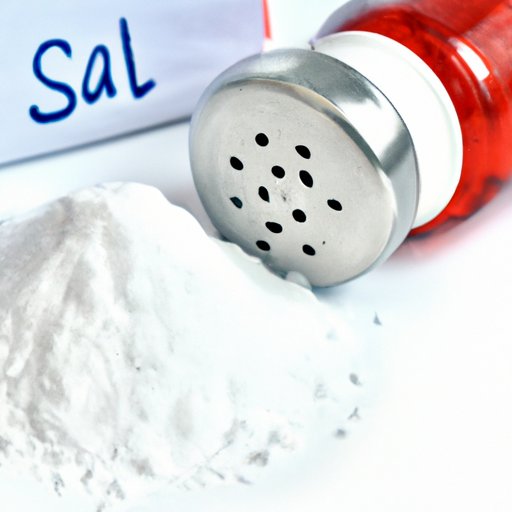
Introduction
It’s no secret that salt makes food taste better. However, overindulging in salt can have serious consequences on your health. Understanding the effects of too much sodium intake is important for maintaining optimal health.

The Dangers of Overindulging in Salt: What Happens to Your Body
Salt affects bodily functions in many ways. In small quantities, sodium is necessary for regulating blood volume, muscle and nerve function, and maintaining electrolyte balance. However, overconsumption of sodium can lead to many negative physical effects.
Exceeding daily salt intake recommendations can lead to elevated blood pressure, which puts an increased strain on the heart and blood vessels and can over time lead to heart disease and stroke. Additionally, too much salt can cause water retention, swelling in the extremities, and lead to dehydration and electrolyte imbalance.
In order to maintain optimal health, moderation in salt intake is important. Moderation in salt intake means avoiding excessive salt consumption, and seeking out low sodium alternatives in food products and meals.
Sodium Overload: The Effects of Too Much Salt on Your Health
One of the most significant relationships between salt and health is the link between salt intake and blood pressure. Consumption of high amounts of sodium directly increases blood pressure in some people, which over time can lead to serious health problems such as heart disease and stroke.
It’s important to understand that high sodium intake not only affects those with blood pressure concerns, but it can affect anyone. In fact, research shows that on average, most people consume double the daily recommended amount of sodium.
When Salt Becomes a Health Risk: Understanding Sodium Intake and its Consequences
The recommended daily intake of sodium is 2,300 mg per day for most adults. However, recent studies have shown that a lower amount, 1,500 mg per day, may be a healthier goal for most adults.
When the recommended daily sodium intake is exceeded, there are increased health risks. Overconsumption of sodium can lead to high blood pressure, stroke, heart disease, and kidney disease. Additionally, high salt intake has also been linked to other health risks such as stomach cancer, osteoporosis, and obesity. Furthermore, people with certain medical conditions such as diabetes and chronic kidney disease are at an even greater risk of worsening health issues when salt intake is excessive.
The Sneaky Ways Salt Can Affect Your Health: Signs and Symptoms to Look Out For
Many sources of salt are hidden and often unnoticed. Condiments, sauces, and other flavorings can add a lot of sodium to meals, as can processed foods such as canned soups, frozen dinners, and packaged snacks. Restaurant meals can also be particularly high in sodium.
Recognizing symptoms of excessive salt intake is important for identifying and managing salt intake. Some symptoms include increased thirst, bloating or swelling, fatigue, and frequent headaches. These symptoms can often be alleviated by reducing salt intake.
Regular health check-ups are important for understanding how salt intake is affecting your health. Regular blood pressure measurements can help identify potential issues early on, allowing for timely treatment and management.
The Domino Effect of Too Much Salt: How it Can Affect Your Heart, Kidneys, and Brain
The link between high salt consumption and heart disease is well-established. Too much salt in the diet increases blood pressure, which over time can lead to heart disease and stroke. Additionally, there is evidence linking high salt intake to kidney disease and cognitive decline.
Reducing salt intake has been shown to help improve kidney function, blood pressure, and brain health. The body is highly adaptable, and over time, reducing salt intake can help improve overall health.
Salt Shock: The Ultimate Guide to Managing Your Sodium Intake for Optimal Health
Reducing salt intake doesn’t mean sacrificing flavor. There are many practical tips for reducing salt consumption, such as using herbs and spices as flavorings, cooking at home, and seeking out low sodium alternatives in food products and meals. Choosing fresh fruits, vegetables and whole grains instead of processed foods can also help in reducing sodium in the diet.
Learning to read food labels is an important step in reducing salt intake. The sodium content of packaged food can vary greatly, so look for low sodium options and aim for food products that contain less than 5% of the daily value of sodium per serving.
A Closer Look at Sodium: The Relationship Between Salt and Chronic Diseases
Research has linked high sodium intake to many chronic diseases. High salt intake can increase the production of inflammatory cells that can lead to chronic diseases such as heart disease, diabetes, and cancer.
Reducing salt intake is a crucial step in avoiding these health risks and maintaining optimal health. Additionally, increasing physical activity, maintaining a healthy diet, and avoiding smoking and alcohol consumption are important for overall health and quality of life.
Conclusion
Overindulging in salt is a dangerous habit that can lead to a wide range of health problems. Understanding the effects of too much sodium intake is important for maintaining optimal health. Moderation in salt intake, reading food labels, and choosing low sodium options are all important steps in reducing salt consumption. Taking proactive steps towards managing salt intake can help mitigate the negative health effects of high sodium intake and maintain optimal health.




